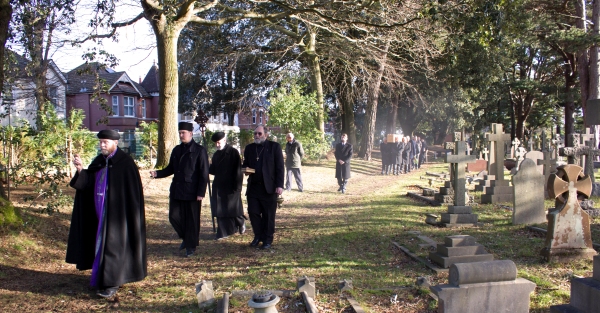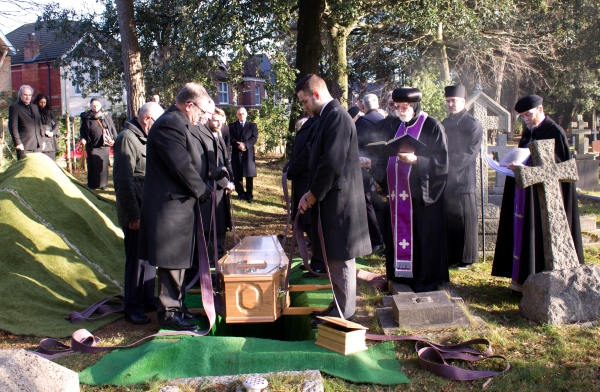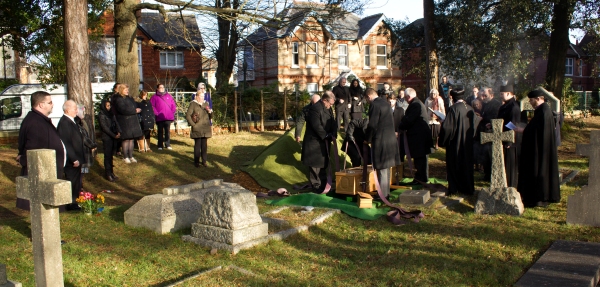Joyce Edwards buried at Bournemouth

Following her death in London on 15 December, Abba Seraphim’s mother, Joyce Edwards, was transferred to Bournemouth for her burial in a church plot there. A Requiem Liturgy was held at the British Orthodox Church of Christ the Saviour in Osborne Road, Winton, celebrated by Abba Seraphim, assisted by Father Simon Smyth and Father Sergius Scott (who also personally represented His Grace Bishop Antony), Deacon Daniel Malyon and subdeacons John Morgan and Antony-Paul Holland. The Church was packed with family, friends and church members who stood around the open coffin in the centre of the church.
After the Liturgy, the burial service took place at the Wimborne Road Cemetery, conducted by Father Simon. The weather the day before had been windy with torrential showers, but the day of the funeral, through the goodness of God, was dry, sunny and mild. Tea was served afterwards at the Norfolk Royale Hotel.
Abba Seraphim said that he and other members of the family were much heartened by the many messages of condolence received, but also by the knowledge that prayers for his mother’s repose were being offered in a number of churches around the world. Among the many condolences received were those from Their Graces Bishop Serapion, of Los Angeles; H.G. Bishop Kyrillos of Milan and Papal Deputy; H.G. Bishop Youannes of BLESS; Bishop Theophilus of the Red Sea; H.G. Bishop Antony of Scotland, Ireland & N.E. England; H.G. Bishop Missael of Birmingham and Bishop Christopher Chessum of the Anglican Diocese of Southwark. H.G. Bishop Angaelos had written to Abba Seraphim: “God strengthened her through a valiant fight and blessed her with a good and full life” whilst His Eminence Metropolitan Bishoy of Damiette wrote, “Your beloved mother with a life time of one complete century is a great treasure in our time. This should be recorded in the history of the Coptic Orthodox Church especially that her son is one of the distinct metropolitans in this historical ancient church of Alexandria/Egypt where the most amazing civilization has existed in the history of humanity. May our merciful God repose her lovely soul through the intercession of our common and most high mother Saint Mary the Mother of God.” His Eminence Archbishop Gregorios of Thyateria & Great Britain (Ecumenical Patriarchate) wrote, “I understand that she was a distinguished and gracious lady who was independently-minded, being blessed with excellent health and mental agility even in her tenth decade, and who (for example) was not even then averse to setting off on holidays abroad despite being of an age when most people would have had neither the stamina nor the courage to do so. It goes without saying that she will have been a great support to you in ways that only a mother can be; and I am told that she became the ‘Mother’ to your Flock as she gathered around her the Faithful for whom you have pastoral care. You must give thanks to the Triune God for her life and for the long years that she lived, as well as for having had the privilege of her being with you for so many years, accompanying you and guiding you in your sacred ministry.” Messages and a floral tribute were also received from the priests, deacons and faithful of the UK subdiocese of the Eritrean Orthodox Tewahedo diocese of Europe as well as a number of Coptic Orthodox clergy in the UK, including Father Moussa Roshdy of Rotherham, Father Antonius Negeb of Bromley, Father Bishoy Naguib of Manchester and Father Seraphim Mina.

In his homily at the Requiem Liturgy, Abba Seraphim said,
“The Sacred Scriptures open with a magnificent and poetic description of the Creation of the Cosmos, of which the highlight is the creation of man, whom God formed from the dust of the ground, breathing into his nostrils the breath of life, so that he became a living soul.
Yet God, Who alone is immortal, as the creator and maker of man, decreed as the punishment for man’s disobedience, that it would be his lot to return to the ground from which he came, and from which he had been sustained during his life on earth, “For out of it wast thou taken, for dust thou art and unto dust shalt thou return.”
The Russian Contakion of the Departed – one of the hymns of the Orthodox Church – witnesses to this as our common end, saying “All we go down to the dust, and weeping oe’r the grave, we make our song: Alleluia, Alleluia, Alleluia !” It is a solemn and sobering thought when we come to part with those we have loved and cherished in life and the weeping reflects our sense of loss and grief.
Yet notice what is the song given to us to sing: “Alleluia, Alleluia, Alleluia !” These words, taken directly from the Hebrew by the earliest Christians, mean “Praise God” – indeed it is a superlative expression of thanksgiving, joy and triumph. In the Roman Rite it is linked particularly to Easter or Holy Pascha but not sung during Lent, as opposed to the Orthodox liturgical tradition where it is sung throughout the entire year.
To the world, – a term the Bible often uses to describe those who do not share the Christian faith – this thankfulness seems at best misplaced, or more generally altogether appears foolishness. But, who is the fool ? The Psalmist tells us, “The fool has said in his heart, ‘There is no God.’ (Psalm LIII: 1) whilst the Apostle Paul tells us that “The wisdom of this world is foolishness with God” (1 Corinthians III: 19-20) and warns us that “The natural man does not receive the things of the Spirit of God, for they are foolishness to him; nor can he know them, because they are spiritually discerned” (1 Corinthians II: 14-15).
As Christians we do not worship a God whom we cannot know or who cares little for us, but rather we worship Him from whom “every good gift and every perfect gift” (James I: 17) is bestowed on us and “Who so loved the world (this time used to encompass all of God’s creation) that He gave His only-begotten Son, that whosever believeth in Him should not perish, but have everlasting life.” (John III: 16)
Through the Resurrection of our Lord Jesus Christ we see that death has been vanquished and that life and immortality are the promise that awaits us. That breath of life, which makes us living souls has not been quenched by death. St. Paul reveals the thread which links us with the creation of man, the resurrection of Christ and our own future condition, “For since by man came death, by man came also the resurrection of the dead. For as in Adam all die, even so in Christ shall all be made alive.” (1 Corinthians XV: 21-22).
Our father among the saints, St. John Chrysostom has left us a sermon on the Resurrection, which in the Byzantine tradition is read at the Paschal Vigil service. It eloquently expresses the Christian belief in resurrection:
“Let none fear death; for death of the Saviour has set us free.
He has destroyed death by undergoing death.
He has despoiled hell by descending into hell.
He vexed it even as it tasted of His flesh.
Isaiah foretold this when he cried:
Hell was filled with bitterness when it met Thee face to face below;
filled with bitterness, for it was brought to nothing;
filled with bitterness, for it was mocked;
filled with bitterness, for it was overthrown;
filled with bitterness, for it was put in chains.
Hell received a body, and encountered God. It received earth, and confronted heaven.
O death, where is your sting?
O hell, where is your victory?
Christ is risen! And you, o death, are annihilated!
Christ is risen! And the evil ones are cast down!
Christ is risen! And the angels rejoice!
Christ is risen! And life is liberated!
Christ is risen! And the tomb is emptied of its dead;
for Christ having risen from the dead,
is become the first-fruits of those who have fallen asleep.”
When the very first corn and other crops begin to shoot they are the promise that more is to follow. These are the biblical first-fruits, which were offered by the priest in thankfulness and faith in the rich harvest which would soon follow. St. Paul tells us that “Now is Christ risen from the dead, and become the firstfruits of them that slept.” (1 Corinthians XV: 20). If Christ is the firstfruits then the righteous, those who have fallen asleep as well as those who remain at the coming of the Lord, are the promised harvest.
Alleluia: Thanksgiving, Joy and Triumph. Thanksgiving, for the assurance that Joyce has passed from death to life eternal; that she has a merciful and loving Saviour Who will grant her forgiveness of her sins; Joy, because she has set her hope in God, the author and maker of her being, so that she now rests in Paradise, where the Choirs of the Saints and the Glorious Assembly of the Just shine like the stars of heaven; and where sorrow and pain are no more, neither sighing, but life everlasting; and Triumph, that she will be numbered with those who rest in the paradise of joy awaiting that great Day of Resurrection when they will dwell in newness of life.
So indeed, let us we make our song, Alleluia, Alleluia, Alleluia !”

